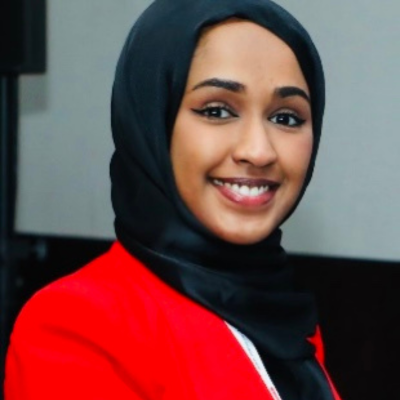
 June 2024
June 2024
What is your current role?
I'm a paediatric haematologist and the clinical lead for the haemoglobinopathy service at Evelina London Children’s Hospital. We see children and young people with sickle cell disease, thalassaemia and other haemoglobin disorders (the substance in our blood that carries oxygen around the body).
We run one of the largest highly specialist (tertiary level) paediatric haemoglobinopathy services in the country and work together with other services across Evelina London to provide the best care possible.
Tell us about a typical day
On a typical day I'll be seeing children and young people who are staying in hospital with an infection or having a sickle cell crisis.
I'll also be seeing children and young people at appointments in our clinics. I see them at special haemoglobinopathy clinics, and also in joint clinics with other specialities from across Evelina London. In these clinics we see children and young people with sickle cell disease, which is a multisystem disorder that affects more than one part of the body. Often they'll have complications with their other organs, which is why it's important that we to work together with other teams.
I'll also attend multi professional team meetings both at Evelina London and across the country to support children and young people with sickle cell disease.
We also have a very active teaching programme. On a weekly basis I'll be providing haemoglobinopathy teaching sessions to medical students, and monthly teaching about children's haematology at both Evelina London and regionally across south London and south east England.
What research are you working on at the moment?
We have a very active research department and are involved in multiple multicentre international clinical trials to improve our understanding of sickle cell disease and how to manage it. This is an exciting and rapidly developing area of research and I'm so proud that we're able to help create a better future for children with sickle cell disease by contributing to new therapies for this condition.
We're currently working on a study looking into the prevalence of PICA. PICA is a feeding disorder in which someone eats non-food substances that have no nutritional value, such as paper, soap, paint, chalk, or ice. Approximately 1 in 3 children with sickle cell disease develop PICA.
We're also creating a study in collaboration with the neurology and neuroradiology teams at Evelina London about how we could use a new type of MRI scanner to look at the brains of children with sickle cell disease.
How do you help young people transition from children’s services to adult services?
I'm very proud of the way we help young people transition from our children’s haemoglobinopathy service to adult services. We work with the fantastic services available at Evelina London and have a specialist transition nurse and children's and adult psychologists to help us. We start preparing young people from when they're 12 years old. We support their move with transition passports, that help educate and empower them to advocate for themselves. This preparatory period really helps them feel comfortable by the time they're 17 and need to move to adult services.
What’s the best thing about your job?
My job is extremely rewarding!
It is a privilege to watch children and young people grow and manage their sickle cell disease, knowing that I'm able to improve their lives with the care I'm providing. I'm blessed to work within a multidisciplinary team, composed of compassionate professionals who are dedicated to improving the lives of our young patients, catering to the unique challenges faced by children with sickle cell disease.
What is your proudest moment?
I'm always proudest every time I see our children and young people thrive, especially when we help them transition from our service into adult services. Teaching a child or young person to understand and manage their condition, advocate for themselves, empowering them to talk about their needs, help them overcome their challenges, and overall lead a fulfilling life, are the best parts of my job.
Why is it important to raise awareness of sickle cell disease?
Education and awareness of sickle cell disease is extremely important. Sickle cell disease is a long-term illness that affects millions of people around the world, mainly people from African and Caribbean family backgrounds, and has a significant health, social and psychological impact. Because of this, the condition still has a huge stigma attached to it. We're committed to advocating for people who have it and encouraging them to talk about it to remove this stigma. We hope to help people feel more included and increase solidarity for the condition.
Find out more about sickle cell disease on the NHS website.

Thank you to the children and young people who have so brilliantly illustrated our blog pages.